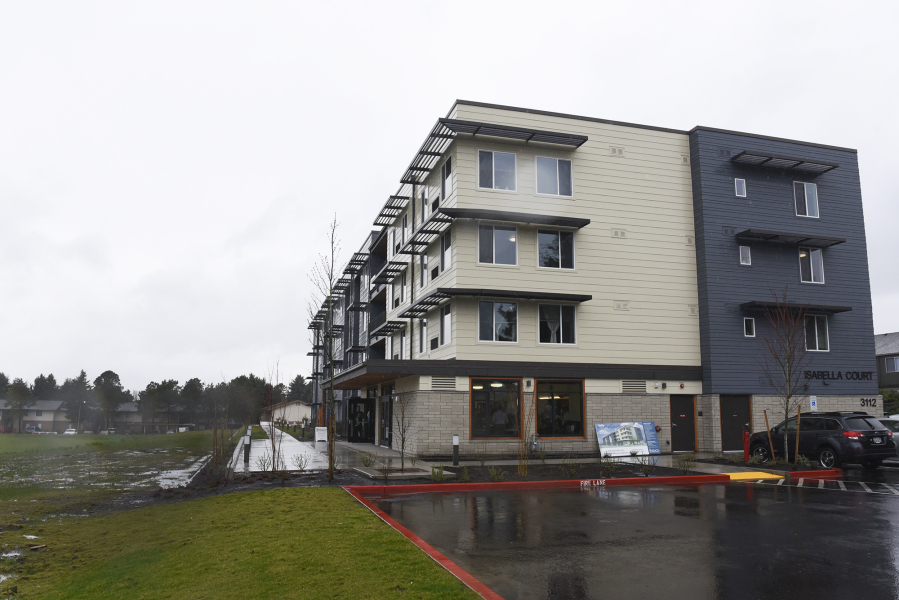Building affordable housing is complex and costly, requiring multiple funding sources or, as it’s called in the industry, a “capital stack.”
Vancouver’s voter-approved Affordable Housing Fund will be a new addition to that stack. The city held a forum Tuesday morning to help people interested in applying for money through the Affordable Housing Fund learn more about that fund as well as other available resources and money.
Up to $3.7 million is available for the city’s first round of awards, aimed at projects that construct new units of affordable housing or rehabilitate existing units. Applications are due by May 15, and the city looks to award money to organizations that already have experience developing, owning or managing affordable housing.
“It probably doesn’t seem like a lot of money when you’re thinking about how much it costs to construct housing, but the city of Vancouver has never had this level of funding before,” said Peggy Sheehan, the city’s community development programs manager.
She said after the forum that the city’s goal is not to fully fund larger projects, but to be part of that capital stack.
“We want to try and leverage other money,” Sheehan said.
An applicant could get money from the city, along with, say, a grant from the county, as well as tax credits allocated by the Washington State Housing Finance Commission, bonds and loans that make a housing project financially viable. It’s a complex and competitive process as each funding source has specific requirements.
One of the requirements to access money from the Affordable Housing Fund is that projects are located in Vancouver.
“Since this fund was supported and voted on by the citizens of Vancouver, and it’s only the citizens of Vancouver who are paying property taxes, the projects must be located in Vancouver. Our plan is to try and serve people who are currently living in Vancouver as well,” Sheehan said.
Units also must remain affordable for up to 20 years to households earning 50 percent of the area median income. About one-quarter of households in the community earn less than 50 percent of the area median income ($36,650 for a family of four) and devote more than half of their income toward rent, Sheehan said. Currently, the maximum rents for tenants meeting the income requirements would be $642 for a studio, $688 for a one-bedroom, $825 for a two-bedroom, $953 for a three-bedroom and $1,063 for a four-bedroom rental.
Awards will be given out in the form of half-grant, half-loan with simple interest for up to 20 years. The money can go toward permitting costs, design, construction, purchasing property and professional services.
Applications will be reviewed by a committee in May and June, and the committee’s recommendations will be given to the Vancouver City Council for adoption in June or July. Then, the contracts for those funds will be executed through the end of the year.
Seeking partners
Varying funding sources and working with other agencies is important, as Vancouver Housing Authority can attest. The housing agency has increasingly sought partnerships with developers and other nonprofits, and learned to be creative with its resources, said Executive Director Roy Johnson. For instance, the housing authority made an arrangement with developers to buy down the rents on 34th Street Apartments, a 20-unit complex for low-income households that’s under construction. The arrangement differs from the housing authority’s Section 8 voucher program, also known as the Housing Choice voucher program, that helps people pay for rent in the private market.
The housing authority is not issuing new Section 8 vouchers beyond those already on the wait list and, for the foreseeable future, won’t be able to provide project-based Section 8 vouchers at new affordable housing developments. It all depends on how the national discretionary budget falls into place, Deputy Director Saeed Hajarizadeh said after the forum.
What VHA is being told by the U.S. Department of Housing and Urban Development is that the agency should anticipate receiving 94 to 97 percent of the funding the federal government gave it in 2016, Hajarizadeh said.
“For that reason, we’ve stopped issuing new vouchers,” he said.
While the housing authority may see its budget decrease, the privately funded Community Foundation for Southwest Washington is growing and looks to leverage that growth to impact the affordable housing crisis.
The foundation had $183 million in charitable assets last year and typically grants money to nonprofits that go toward specific services or projects. For the first time, the foundation looks to possibly loan money to nonprofits pursuing housing projects. Jennifer Rhoads said the foundation has never been a lender before, but lending is done at other, larger community foundations. (There are more than 700 community foundations nationwide.)
This type of lending is called impact investing because the investments have a measurable social benefit. The community foundation looks to give out its first loan by the end of the year, but it’s still a work in progress. Rhoads said donors are also interested in impacting the affordable housing crisis and the foundation may be able to make those connections.
“This isn’t just about lending,” Rhoads said. “We’re really trying to look at all the philanthropic resources.”




